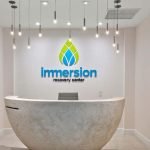Immersion Recovery Center - TREATMENT REVIEWS
Immersion Recovery Center is an addiction-focused wellness center from South Florida and offers clinically dynamic therapies to deliver successful outcomes. It claims to help people get back on their feet and live the life they deserve without relying on alcohol or drugs. By restoring their spiritual, emotional, relational, and physical well-being, the rehab sets its clients on the road to long-term recovery. All programs occur in a healing oasis under the supervision of credentialed specialists who use time-tested therapy approaches.
Read Also About Transcend Recovery
Immersion Rehab is also a proud Guardian Recovery Network (GRN) member and a substance use disorder leader with over two decades of experience. It provides all clients and their loved ones a continuum of care to achieve and maintain sobriety. All treatment plans at Immersion are created by top addiction treatment specialists in the light of extensive feedback given by clients. Claimed to be a leading addiction treatment center in South Florida, it utilizes holistic methods and evidence-based practices to tailor individual recovery experiences. The experts understand that addiction is a disease and can strike anyone regardless of age, gender, socioeconomic status, or education, and they are there to guide them toward healing.
The Phases of Treatment at Immersion Recovery Rehab
The treatment program at Immersion Recovery Center includes three phases, each with a specific time frame, objectives, and goals. Let’s look at these three phases one by one.
Phase One: Stabilization
Phase one of recovery involves an in-depth assessment of a client’s circumstances, followed by education and stabilization. The duration of this phase may vary from 3 to 28 days, depending on how well an individual responds to treatment. Experts aim to help each patient escape the obsession with drug use while encouraging them to develop new, healthier patterns. Phase one of treatment typically occurs as medical detoxification and residential inpatient treatment.
All treatment activities included in phase one occur in a state-of-the-art residential facility and begin with a medical detox. The detox process aims to stabilize the body by eliminating harmful toxins. The slow and comfortable process takes place under the supervision of medical experts and allows patients to loosen the grip of addiction on their bodies slowly.
Once the detox is complete, all clients transition to a residential treatment program where they undergo thorough evaluations and assessments by the clinical team. They also get access to various services depending on their treatment, such as nutritional and psychical rehabilitation, medication therapy, etc. Everyone gets to participate in the educational sessions to understand the addiction disease model and how it can affect their behaviors and life. At this point, the rehab team also starts familiarizing them with focused 12-step practices. Once the clients are stable and free from the physical and psychological grip of addiction, they can move to the second phase of treatment.
Phase Two: Motivation
Phase two of treatment aims to help clients identify destructive ideas and thinking patterns and learn how to manage them. This phase typically runs for 28 days, but the length may vary depending on individual needs. Clients usually enroll in partial hospitalization programs to undergo this phase to achieve the following benefits:
- Identify and sort barriers impeding recovery progress
- Learn healthy stress management techniques
- Acquire sound behavior and judgment regarding additional freedoms and privileges
- Demonstrate family progress
The second phase of the immersion program includes an intensive treatment plan that runs for two to four weeks and identifies all potential roadblocks hindering recovery. Many clients in this phase are the ones who have gone through multiple attempts of recovery with failure. The treatment team sets an environment where they can understand the reasons behind their past failures and work on them to achieve long-term sobriety. This phase also attempts to pinpoint any patterns, behaviors, or attitudes running contrary to sobriety and attempts to manage them.
A common part of phase two is re-establishing healthy relationships with family members and loved ones. Clients also slowly form sober support networks while increasing their exposure in local communities. They are also encouraged to integrate recovery practices, such as meditation, prayer, mindfulness exercises, and daily inventory, into their everyday life. Experts work closely with each client to develop their personalized 12-month recovery plan that they should follow in the future to maintain recovery.
Phase Three: Reintegration
Phase three of recovery utilizes the Immersion Method and its application in real-life situations. It focuses on working closely with clients to help them seek education, employment, or volunteerism. The duration of this phase varies depending on individual circumstances but is typically between one to three months. Phase three takes place on multiple levels, such as sober living, aftercare planning, and intensive outpatient programs, and aims to help clients slowly progress toward independent living.
Phase three aims to help clients who have benefitted from the previous two phases maintain their progress. Hence, the staff involved in this phase provides critical additions to patients’ already-developed skill sets. These additions further enhance the likelihood of maintaining addiction-free lives in the long run. Experts at Immersion Recovery understand that many individuals who make amazing improvements in safer environments of a residential setting relapse quite quickly the minute they re-integrate into the external world. Hence, they adopt a multi-faceted approach in phase three of the treatment to address all these potential risks and make independent living easier for all clients.
As a part of phase three, clients get to address their daily needs and requirements, such as education, employment, and other volunteer opportunities that bring them a sense of accomplishment. Patients can also work on achieving financial independence, which provides them with a greater sense of self-esteem and self-confidence. Moreover, they also learn how to hold themselves accountable for progress while maintaining a sober routine. To graduate from phase three of treatment, a client must exhibit must prove that:
- they have sound reason and judgment in all facets of life
- they are willing to participate in recovery and treatment work independent of the staff interventions
- they are actively working on the 12-step recovery program
FAQs
What is the campus like at Immersion Recovery Center?
Immersion rehab helps clients seek treatment the moment they step into the facility. From pre-assessment to insurance verification and recovery treatment, it helps them smoothly transition from one step to another. Apart from the evidence-based programs, clients can access various amenities and luxuries. The campus currently has the following facilities:
- Private bedrooms & bathrooms
- Outdoor living areas
- A classically trained chef team
- Gender-specific programs
- Spacious dining areas
- Recreation center
- Comfortable meeting and therapy areas
- Client entertainment lounge
Will Immersion Recovery Center accept my insurance?
Immersion rehab accepts most major insurance plans and even offers a free insurance benefits check for those interested in joining the rehab. The admission team speaks with their client’s insurance company on their behalf and gets a verification of their insurance benefits. Remember that Medicare and Medicaid are unfortunately not accepted at the rehab.
What is the admission process like at Immersion?
Admissions at Immersion Rehab are quick and easy and involve calling the admission team by phone. The counselors at the rehab perform initial assessments over the phone within 10 minutes to decide if the rehab can fit a client’s needs. The admission team verifies the insurance benefits and arranges an intake time. It also arranges transport for clients who need it.
Will my treatment be confidential?
Every treatment step at Immersion Recovery Center takes place in complete privacy and secrecy. The staff team takes extra measures to ensure they go above and beyond the usual confidentiality protection methods, such as HIPAA, to make the experience as private as possible. It also welcomes patients to talk about their specific privacy concerns with the team so that these concerns can be sorted out.
Immersion Recovery Center- Cost/Prices, Center/Clinic/Retreat/Resort Facilities, Inpatient Treatment Program Services
- Title Immersion Recovery Center
- Treatment Program Addiction / Alcohol Addiction / Drug Addiction / Cocaine Addiction / Heroin Addiction / Marijuana Addiction / Detox / Prescription Drug Addiction / Dual Diagnosis
- Location United States/ Florida/ West Palm Beach
- Languages English
- Accommodation Private Room
- Environment Coastal, City
- Age Adult
- Approach 12 Step, One to One, Group
- Method AA/NA Meetings, Nutritional Coaching, Eye Movement Therapy (EMDR), Family Therapy, Maditation, Mindfulness based stress reduction (MBSR), Yoga, Cognitive Behavioral Therapy (CBT), Dialectical Behavior Therapy (DBT), Social competence training & Life Skills
- Aftercare Yes
- Amenities Private Chef, Private Room, Private Residence, Insurance Accepted, Leisure Activities
- Gender Women & Men
Immersion Recovery Center Contact
- E-mail info@immersionrecovery.com
- Website https://www.immersionrecovery.com/
- Phone +1 5615299008
-
Address
3333 S Congress Ave
Suite 401, Delray Beach, FL 33445.

 Immersion Recovery Center
Immersion Recovery Center





